|
|
|
Sort Order |
|
|
|
Items / Page
|
|
|
|
|
|
|
| Srl | Item |
| 1 |
ID:
128973
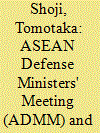

|
|
|
|
|
| Publication |
2013.
|
| Summary/Abstract |
This paper explores the ASEAN Defense Ministers' Meeting (ADMM) and the ADMM Plus, focusing
on ASEAN's purpose to launch a meeting of defense ministers in terms of community building, the
evolution of the ADMM with the ensuing establishment of its enlarged version - the ADMM Plus, and
the significance of the ADMM Plus from a comparative perspective. A brief analysis of the approach
taken by Japan toward this multilateral framework, as a long-time dialogue partner of ASEAN, is
added to the conclusion. Generally, the ADMM and the ADMM Plus processes have so far developed
steadily, materializing in an incremental way the original visions to promote institutionalization
and practical cooperation. It is highly likely that the ADMM Plus will regularize the annual joint
exercises in nontraditional security based on the system of rotational Expert Working Groups
(EWGs). Activities in the ADMM (Plus) imply ASEAN's strong will to differentiate the framework
from the ASEAN Regional Forum (ARF), which countries concerned have found to be ineffective
for promoting conflict prevention and dealing with confrontational, sensitive issues of traditional
security, like the South China Sea. Today, the participants in the ADMM Plus including Japan seem
to fully recognize the utility of the platform. This is not only in terms of having a regular meeting
venue of relevant defense ministers, but also fostering deeper cooperation of defense and security by
conducting meetings at various levels of defense officials and joint exercises in nontraditional security
areas. However, the participants in the multilateral framework are going to see some future challenges
for the relevance of the mechanism, including territorial and maritime disputes.
|
|
|
|
|
|
|
|
|
|
|
|
|
|
|
|
| 2 |
ID:
159166
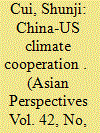

|
|
|
|
|
| Summary/Abstract |
Building “a new model of major-country relations,” particularly with the United States, has become one of China's major foreign policy objectives. Yet, outside of China, the concept is often seen as an empty slogan with no practical utility. By examining both the concept of the new model of major-country relations (NMMCR) and China's climate cooperation with the United States, I argue that the concept and initiative of NMMCR—with its emphasis on a common fate and shared futures, viewed as a means of achieving cooperation rather than conflict to achieve common goals— reflects well the changing environment of the twenty-first century and is thus a positive new development in China's foreign policy.
|
|
|
|
|
|
|
|
|
|
|
|
|
|
|
|
| 3 |
ID:
077038
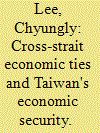

|
|
|
| 4 |
ID:
139384
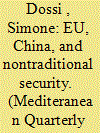

|
|
|
|
|
| Summary/Abstract |
As political instability challenges China’s growing interests in the Mediterranean region, the European Union might prove to be the right partner for Beijing. This essay assesses the prospects for EU-Chinese security cooperation in the region. A shared doctrinal concern with nontraditional security provides a solid foundation, as proved by antipiracy efforts in the Gulf of Aden. This paves the way for nontraditional security cooperation in the Mediterranean region, for instance in the field of noncombatant evacuation. Yet a crucial precondition is that the EU behaves more coherently, in order to be perceived by China as a reliable partner.
|
|
|
|
|
|
|
|
|
|
|
|
|
|
|
|
| 5 |
ID:
133070
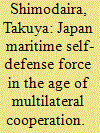

|
|
|
|
|
| Publication |
2014.
|
| Summary/Abstract |
Isaiah Berlin's essay The Hedgehog and the Fox-made famous by the adage "The fox knows many things, but the hedgehog knows one big thing"-explores the pros and cons of a highly focused defense strategy.1 The hedgehog curls up in a ball and defends itself. Hiroshi Doi, former professor at the National Defense Academy of Japan, advocates a "hedgehog-style defense" for Japan, claiming that the country's postwar security policies can still defeat any "sly fox" confronting the nation.2 However, given the emergence of an increasingly complex global security environment, it may be argued that Japan's "defense-only defense policy" is no longer valid. Indeed, must Japan remain a hedgehog forever?
|
|
|
|
|
|
|
|
|
|
|
|
|
|
|
|
| 6 |
ID:
142207
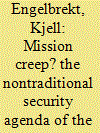

|
|
|
|
|
| Summary/Abstract |
In 2008–2011, the Group of 20 swiftly eclipsed the Group of 7, created in the mid-1970s as an informal mechanism for stabilizing markets and facilitating transnational currency exchange and investment. Several observers have expressed the view that the former, broader group is also destined to appropriate the role of the Group of 8, the G7's pioneering successor in the realm of nontraditional security. This article examines the G7/8 legacy of forging quasi-permanent institutional arrangements and frameworks in this policy area and goes on to gauge nontraditional security initiatives subsequently launched by the G-20. Having juxtaposed the past record of these bodies and analyzed the interests and power dynamics that influence member state action in the short and long term, the article outlines three basic options for how the relationship between the G-20 and the G7/8 may evolve.
|
|
|
|
|
|
|
|
|
|
|
|
|
|
|
|
| 7 |
ID:
084188


|
|
|
| 8 |
ID:
125775
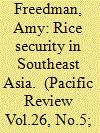

|
|
|
|
|
| Publication |
2013.
|
| Summary/Abstract |
High commodity prices in 2007-2008 and again in 2011, particularly for crops such as rice and corn, have forced countries in Southeast Asia to look more closely at their agricultural and trade policies for rice and grains. While all countries in the region are heavily dependent on rice for food security, there is significant variation in countries' abilities to be self-sufficient in rice production. This paper examines the factors that contribute to food insecurity in SEA, which communities are hit hardest, and the diversity of responses to this situation. And, the paper asks what the prospects might be for greater cooperation in coordinating rice (and other crops more generally) policies so as to better ensure reliable access for more citizens in the region. Thailand, Vietnam, and Cambodia are all major exporters of rice; whereas Indonesia, Malaysia, Singapore, and the Philippines are all importers of rice. Since the sharp spike in prices in 2008, countries which import rice have developed more comprehensive plans to become self sufficient in rice production. Individual country's policies will have dramatic effects on regional trade relations and dynamics. There have been some regional attempts to create a more cooperative framework for addressing food security, but these efforts have not yet played a significant role in reshaping domestic policies. This paper will assess the chances of further cooperation and success (or the chance of failure and less engagement) in the future.
|
|
|
|
|
|
|
|
|
|
|
|
|
|
|
|
| 9 |
ID:
112831


|
|
|
|
|
| Publication |
2012.
|
| Summary/Abstract |
The China-US relationship is a multidimensional complex one involving both traditional and nontraditional security issues. However, nontraditional security issues (NTS) have become paramount in reshaping Sino-US relations, though there is no absolute boundary between NTS and traditional security. With both traditional security issues and NTS issues being solved according to the involved nations' prior experience in dealing with traditional security matters, it stands to reason that there is a very fine line, if that, between NTS and traditional security and that they are not necessarily mutually exclusive. Although the energy threat is more likely to be considered a traditional security matter than concerns such as the terrorism threat or climate change issue, the energy threat actually contains some NTS characteristics, like how to get full use of natural resources and the relevance with climate change. This article, to some extent, explains the dynamic between traditional and nontraditional security through the case study of China-US relations.
|
|
|
|
|
|
|
|
|
|
|
|
|
|
|
|
| 10 |
ID:
086655


|
|
|
|
|
| Publication |
2009.
|
| Summary/Abstract |
This article reviews both the developments of and problems within Russian-South Korean arms trade cooperation. From a nontraditional and economic security perspective, this article argues that Russia's interest in selling weapons to South Korea has been primarily motivated by economic concerns and that this trade has also secured the economic interests of both countries. By being a new consumer of Russian arms, South Korea can help to alleviate both the serious depression that occurred in Moscow's defense industry after the collapse of the Soviet Union and-Moscow's more immediate concern-Russia's debt to South Korea. In addition, the arms trade with Russia has enabled South Korea to purchase new weapons and space high technologies at very competitive prices. There nevertheless remain a number of obstacles in the Russian-Korean arms trade.
|
|
|
|
|
|
|
|
|
|
|
|
|
|
|
|
|
|
|
|
|